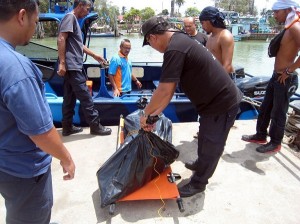
This handout photo taken on August 4, 2013 and released by the Malaysian Maritime Enforcement Agency shows Maritime officials at the Maritime office in Tanjung Sedili in Johor state transporting three victims found at sea after a wooden boat that was believed to be carrying 44 people, including women and children, from Malaysia’s southern Johor state to Indonesia’s Batam island sank off the coast. Malaysian rescuers on August 4 found the three bodies at sea while hopes were fading for 37 other Indonesians who went missing days earlier when their boat sank. AFP PHOTO / Malaysian Maritime
KUALA LUMPUR — Malaysian rescuers said Monday they would stop searching for 33 Indonesians missing at sea, more than four days after their boat sank on their way home to celebrate Eid al-Fitr, with seven confirmed dead.
The wooden boat was believed to be smuggling 44 people, including women and children, from Malaysia’s southern state of Johor to Indonesia’s Batam island. It sank in rough seas late Thursday, and four men were rescued the following day.
Amran Daud, an official with the Malaysian Maritime Enforcement Agency (MMEA), said in a statement that search and rescue operations would stop at sunset Monday as chances of finding survivors had become “increasingly thin.”
Rescuers recovered the bodies of four more men Monday despite rough seas and heavy rain hampering efforts.
Three other bodies — two women and a man — were found on Sunday, far away from the accident site as strong currents are believed to have scattered the corpses.
Amran said authorities decided to stop search efforts after “assessing various aspects, including monitoring by helicopters” without finding any clues of survivors.
“But MMEA will continue to have routine patrols in the area, and if there are new leads we will mobilize our members,” he said, adding 130 rescuers had scoured an area of almost 3,000 square miles (7,800 square kilometers) since last Friday.
The boat, which authorities believe was “not seaworthy,” capsized in high waves about 13 nautical miles (24 kilometers) off the coast.
The passengers are believed to have been illegal migrants who came to Malaysia to work but wanted to return to their country to celebrate Thursday’s Eid al-Fitr, the end of the Muslim fasting month of Ramadan, without passing border controls.
One of the survivors found on Friday said he paid some 1,300 ringgit ($400) for what was to be his first trip home in 13 years.
A search and rescue coordinator told AFP that as many Indonesians sought to sneak back to their country and maritime officials had stepped up patrols, smugglers were choosing more dangerous disembarkation points along the coast.
“It’s too dangerous to travel there for small vessels… The swell is big, the wind is strong, the weather unpredictable,” he said, referring to the part of the coast from where Thursday’s ill-fated boat left.
An estimated four million foreigners, mostly from poorer countries in the region such as Indonesia and Myanmar, work in Malaysia — many illegally. They fill low-paying jobs shunned by locals on plantations, construction sites and in factories.
Migrant labor right activists have called on Malaysia to further step up patrols and charge boatmen and any official found to be taking bribes to turn a blind eye to the smuggling.
In mid-July an Indonesian woman died and seven people went missing after their wooden boat capsized off Johor.
Twenty-seven Indonesians, heading to Batam without valid travel documents, were rescued.